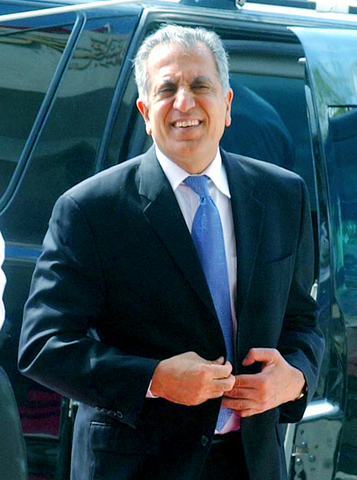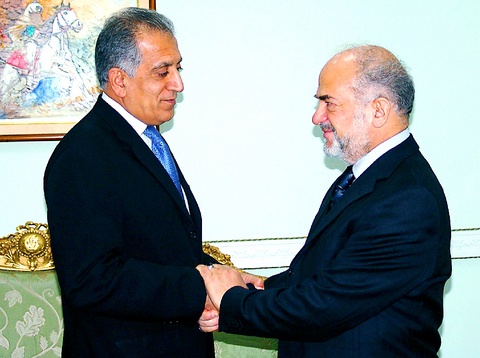On the morning of Sept. 11, 2001 Condoleezza Rice was chairing a meeting of the national security council in the White House. By the time the assembled foreign policy wonks saw the second plane hit the World Trade Center, it was becoming clear that the US was being attacked by al-Qaeda and the country was at war.
From that moment on, a previously obscure staffer became the center of attention, bombarded with questions. His name was Zalmay Khalilzad, and the country of his birth, Afghanistan, was about to become a war zone.
Since then Khalilzad, who became an American citizen in 1984, has become the country's most indispensable diplomat. He was in Kabul just after the fall of the Taliban and in Baghdad days after the first US troops reached the Iraqi capital. When postwar Afghanistan was in danger of being torn apart by warlords in 2003, he was appointed ambas-sador to Kabul to help prop up Hamid Karzai and oversee elections.

PHOTO: AP
Last June, when Afghanistan appeared relatively stable but Iraq was imploding, he was transferred to Baghdad. His title there is ambassador, but he is more of a viceroy, with 5,000 staff in the biggest US embassy in the world and backed by more than 130,000 US troops.
It is an unenviable job. For the insurgents, Khalilzad represents the highest value target possible, and on the few occasions he ventures outside his offices in Saddam Hussein's former marble presidential palace and out of Baghdad's Green Zone, he must do so with a small army around him, complete with air support.
But he has been strikingly successful. He was acclaimed for brokering a constitution last year, a feat that frequently involved improvising US policy on the spot. "I know he has considerable sway. I saw it first hand," said Peter Galbraith, a former US diplomat who advised the Iraqi Kurds during the drafting of the constitution. "His predecessors were visiting the leaders, repeating the talking points."

PHOTOS: AP
He had the clout to call up the National Security Council, a former NSC colleague said. "Most feel that he is a breath of fresh air in Baghdad after the rather stale immobility of the [John] Negroponte period." Khalilzad's predecessor is now director of national intelligence.
It is easy to see why Khalilzad is essential to the US effort in Iraq. He combines the commitment of a Washington neoconservative with the cultural sensitivity of his foreign roots. He is a Muslim, born in 1951 in Mazar-i-Sharif, where his father was a middle-ranking civil servant married to an illiterate but strong-willed woman who appears to have been a significant influence on his life.
He told the New Yorker magazine his mother "could not read or write herself, but she would have the kids read the newspapers to her."
"I think if she had been born at a different time she would have been quite an established political figure," he said.
Urged on by his mother, the young Khalilzad won an exchange scholarship to California for a year at the age of 15, and then, after he finished school, to the American University in Beirut. His background gives him a familiarity with the Arab negotiating style.
Unlike most American diplomats, he is prepared to sit chatting for hours, fidgeting with prayer beads, and listening to local leaders.
Khalilzad's path keeps getting steeper. He has to square the circle of US policy in Iraq, coaxing Shia leaders to cede some power to the Sunni minority in order to form a government, while extremists on both sides are murdering each other. It is little wonder that the US' man in Baghdad is drifting off message. While the White House and the Pentagon have been pumping out mostly happy talk on Iraq, Khalilzad has become outspoken about the scale of the problems facing the country and more apocalyptic in his predictions.
This week, he told the LA Times that the invasion of Iraq opened a Pandora's box of sec-tarian conflict with the potential to erupt into full-scale civil war.
Khalilzad's experiences in Baghdad have led him to voice some doubts over the timing of the invasion, and he is said to believe that the postwar period was handled abominably, but his conviction that Saddam had to be removed appears unshaken.
His faith in US military power as a vehicle for democratic change was passed on by Albert Wohlstetter, a foreign policy guru at the University of Chicago, where Khalilzad arrived in 1975 from Beirut to work on a doctorate. Professor Wohlstetter's proteges read like a who's who of the neoconservative movement, including Paul Wolfowitz and Richard Perle.
As a leading graduate of the neoconservative school, Khalilzad is now in a unique position. Most of the others who pushed for invasion have moved on.
Wolfowitz is running the World Bank. Perle is a private sector consultant. Meanwhile, Khalilzad has stayed on to face all the messy consequences.

Most heroes are remembered for the battles they fought. Taiwan’s Black Bat Squadron is remembered for flying into Chinese airspace 838 times between 1953 and 1967, and for the 148 men whose sacrifice bought the intelligence that kept Taiwan secure. Two-thirds of the squadron died carrying out missions most people wouldn’t learn about for another 40 years. The squadron lost 15 aircraft and 148 crew members over those 14 years, making it the deadliest unit in Taiwan’s military history by casualty rate. They flew at night, often at low altitudes, straight into some of the most heavily defended airspace in Asia.

Beijing’s ironic, abusive tantrums aimed at Japan since Japanese Prime Minister Sanae Takaichi publicly stated that a Taiwan contingency would be an existential crisis for Japan, have revealed for all the world to see that the People’s Republic of China (PRC) lusts after Okinawa. We all owe Takaichi a debt of thanks for getting the PRC to make that public. The PRC and its netizens, taking their cue from the Chinese Communist Party (CCP), are presenting Okinawa by mirroring the claims about Taiwan. Official PRC propaganda organs began to wax lyrical about Okinawa’s “unsettled status” beginning last month. A Global

Taiwan’s democracy is at risk. Be very alarmed. This is not a drill. The current constitutional crisis progressed slowly, then suddenly. Political tensions, partisan hostility and emotions are all running high right when cool heads and calm negotiation are most needed. Oxford defines brinkmanship as: “The art or practice of pursuing a dangerous policy to the limits of safety before stopping, especially in politics.” It says the term comes from a quote from a 1956 Cold War interview with then-American Secretary of State John Foster Dulles, when he said: ‘The ability to get to the verge without getting into the war is

Like much in the world today, theater has experienced major disruptions over the six years since COVID-19. The pandemic, the war in Ukraine and social media have created a new normal of geopolitical and information uncertainty, and the performing arts are not immune to these effects. “Ten years ago people wanted to come to the theater to engage with important issues, but now the Internet allows them to engage with those issues powerfully and immediately,” said Faith Tan, programming director of the Esplanade in Singapore, speaking last week in Japan. “One reaction to unpredictability has been a renewed emphasis on